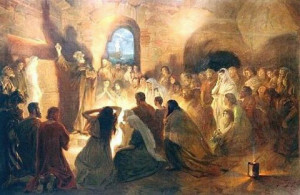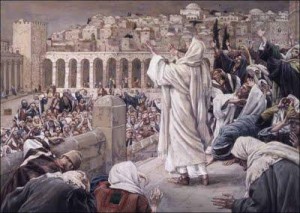The waters of worldliness are lapping over into the ark of safety and threaten to overthrow the faith of many. Christians are forgetting their Christ-given mission as Christians and are acting as if the Lord never spoke about certain moral, doctrinal, philosophical and theological issues. Many Christians are adopting the approaches and attitudes of the secular and sectarian worlds and, all the while, political correctness is destroying our society and is contaminating the Lord’s church.
I offer the following as an example of this sad trend. It was stated in a recent article in a well known brotherhood publication (“Homosexuality and the Church“) that “Teenage members of Churches of Christ perceive judgmental attitudes as hampering the fellowship’s spread of the Gospel.” The topic of the article was homosexuality. The judgmental attitude spoken of was calling homosexuality a sin. This was further described as a one dimensional approach to the problem of homosexuality.
The answer to the problem of homosexuality, according to the writer of the article, is not to try to change anyone’s sexual orientation but to “discuss struggles.” They spend a lot of time in prayer, but it is not to “pray the gay away.” Rather, the group “feels like” they can get into the work of the Holy Spirit in these individuals’ lives.”
Not having the space to address the gross misunderstanding concerning the Holy Spirit manifested in such a statement (see here), it should be clear to all Christians familiar with God’s word that New Testament and Old Testament writers–actually inspired by the Holy Spirit–spoke plainly about “homosexuality.” “Homosexuality,” or, as the Bible calls it, sodomy, is an “abomination,” something that is morally disgusting or abhorrent (Lev. 18:22). It is a sin that is worthy of death (Lev. 20:13). It is “unclean,” “dishonorable,” “vile,” “against nature,” “unseemly,” and the product of a “reprobate mind” (Rom. 1:18-32). Those who engage in this activity cannot inherit the kingdom of God (I Cor. 6:9,10). This is the way New Testament writers spoke on the subject. But according to our “enlightened” society today, especially our teenagers, if this article is to be believed, this approach was dead wrong and we should “reframe the discussion” and start talking “about love, compassion, support and grace.”
Many have allowed liberal social theories to color their view of the gospel and of the church. But the Lord’s church is not a social experiment, it is the eternal Kingdom of God (II Pet. 1:11; Dan. 2:44; Matt. 16:18,19). It is not open for restructuring. The gospel is not social theory, it is the inerrant Word of God and it is not subject to alteration (Gal. 1:6-9). If it is indeed true that the majority of teenagers in the Lord’s church in our generation look upon the preaching of the Old Jerusalem Gospel as being judgmental, then sadly many in the Lord’s church have failed in their responsibility in bringing up their children in the nurture and admonition of the Lord (Eph. 6:1-4); a generation has arisen which knows not Jehovah nor the works He has done for spiritual Israel (Jud. 2:10).
Sodomy is but one example where the world has influenced the thinking of many in the Lord’s church. The increasing focus on entertainment in the church is another. Reliance upon feelings instead of a “thus saith the Lord” is yet another example. The list could be extended but the point is instead of making excuses for sin, we ought to be condemning it. This is not being judgmental, this is being like Christ and His apostles. Should the Son of God have had a “peacemakers conference” with the scribes and pharisees or was He right when he called them “hypocrites” (Matt. 23)? Should the apostles have spent “a great deal of time “listening and asking questions” rather than attacking and condemning people” or were they right when they told the crowd assembled on Pentecost that they had with “wicked hands” crucified the Son of God (Acts 2:22-36)? Should Paul have viewed the Athenians as “much more than their sinful identity” when he told them that they ignorantly worshiped an unknown God (Acts 17:23,31)?
The Lord’s prohibition against judging others (Matt. 7:1-5) was against superficial, hypocritical judgment. Jesus further said, get the beam out of your own eye and then you will see clearly to judge others correctly (Matt. 7:5). We cannot help but judge. It is a part of life. The judgment must be scriptural for Jesus said, “Judge not according to the appearance, but judge righteous judgment” (John 7:24; cf. II Chron. 19:6), but we cannot refrain from judging. Indeed, “to do justice and judgment is more acceptable to the Lord than sacrifice” (Proverbs 21:3).
The bottom line is this: It is not judgmental to call sin sin. Instead of making sinners feel good about themselves in their sin, we ought to be making them–and ourselves–uncomfortable in sin (Acts 2:37). This is not wrong, it is the work of God. All attempts to soften the impact of God’s word are misguided.
I end with the words of Peter: “Whether it be right in the sight of God to hearken unto you more than unto God, judge ye” (Acts 4:19).
Eric L. Padgett




